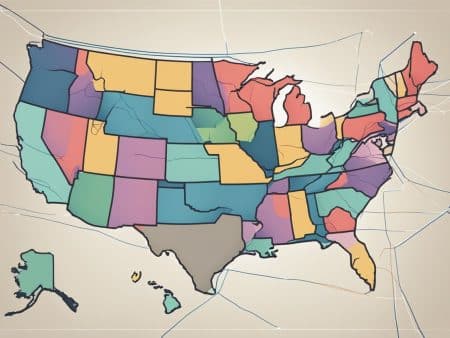Eight states offer regulated online poker in America: Connecticut, Delaware, Rhode Island, Nevada, New Jersey, Pennsylvania, West Virginia, and Michigan. While player demand grows nationwide, legal access remains limited to these jurisdictions.
The Multi-State Internet Gaming Agreement (MSIGA) marks a significant development in US online poker. Five states now participate in this player-sharing network, allowing operators to combine player pools across state lines. The Interstate Wire Act and Unlawful Internet Gambling Enforcement Act (UIGEA) remain key federal regulations shaping the industry’s legal framework.
Our state-by-state guide breaks down online poker legislation, player requirements, and vital information about consumer protections and tax responsibilities. Players seeking information about regulated markets will find state-specific details on licensing, operations, and compliance standards.
21+. Bet With Your Head, Not Over It! Gambling problem? Call 1-800-GAMBLER.
Current Legal Online Poker States in 2025
Nevada launched state-regulated online poker first, with Delaware and New Jersey close behind. Five more states joined the legal poker landscape: Pennsylvania and West Virginia (2019), Michigan and Connecticut (2021), and Rhode Island (2024).
8 States with Regulated Online Poker
Pennsylvania and Michigan stand out among legal poker states. Pennsylvania’s market shows steady growth – $32.40M in online poker revenue for 2021, rising to $33.70M in 2022. Michigan hit the ground running after dealing its first online hand January 29, 2021.
Interstate Gaming Compacts
The Multi-State Internet Gaming Agreement (MSIGA) powers shared player pools across state lines. Delaware and Nevada created MSIGA in 2014, New Jersey signed on in 2018. Michigan players gained access to the network in 2023, connecting them with New Jersey, Nevada, and Delaware players. Pennsylvania targets early 2025 for MSIGA entry, aiming for first-quarter launch.
State-by-State Requirements
Each state runs its own regulatory playbook:
- Michigan pairs with land-based casinos, enforces strict location tracking
- New Jersey requires Atlantic City casino partnerships
- Pennsylvania maintains thorough licensing through Gaming Control Board
- Nevada keeps focus on poker while others expand to full casino gaming
Connecticut and West Virginia have laws in place but haven’t launched poker rooms yet. Rhode Island’s new legislation puts Bally’s Corporation in charge of online poker through its two land-based properties.
21+. Bet With Your Head, Not Over It! Gambling problem? Call 1-800-GAMBLER.
How to Play Legal Online Poker by State Type
Legal online poker rules vary by state. Smart players check their state’s status first before hitting the virtual felt.
Steps for Regulated State Players
Non-residents can play in regulated states – just stay within state lines while playing. Getting started means:
- Proving you’re 21+
- Showing valid ID
- Passing location checks
- Setting up payment with licensed poker rooms
Location tracking keeps games inside legal boundaries. Licensed rooms verify player identity through government-issued documents before real-money action starts.
Options for Unregulated State Players
Players outside regulated states have choices too. No U.S. player faces charges for online poker games. Offshore rooms claim players from all states but run without U.S. oversight.
Offshore poker comes with risks. These sites operate beyond U.S. law – no protection if things go wrong. Players can’t recover funds through legal channels if problems arise.
Watch out for state-specific rules. Washington makes online poker a Class C felony, though they chase operators, not players. Most states target the house and payment companies, leaving players alone.
Do your homework on any poker site’s reputation and licenses. Extra important for offshore rooms – quality and security vary wildly between operators.
21+. Bet With Your Head, Not Over It! Gambling problem? Call 1-800-GAMBLER.
Player Protection in Legal Markets
Licensed poker rooms pack serious security muscle. ID checks guard against fraud and keep underage players out.
Identity Verification Requirements
Players show government photo ID and recent utility bills to prove address. Poker rooms watch accounts for fishy behavior and follow strict Know Your Customer (KYC) rules.
Geolocation Technology
GeoComply runs over 350 location checks to keep games inside legal states. The system spots and blocks VPNs and remote access tricks. Smart Wi-Fi tracking works right up to state lines.
Responsible Gaming Tools
Legal rooms give players control:
- Set deposit caps and time limits
- Take breaks from 24 hours to forever
- Track play patterns in real-time
- Pick table and tournament limits
Dispute Resolution Process
When things go sideways, regulated rooms offer proper dispute fixes through Alternative Dispute Resolution (ADR). eCOGRA steps in as the neutral ref for gambling disputes. Players and poker rooms work with mediators to sort things out.
These safeguards let players focus on their game instead of sweating security. ID checks, location tracking, and player protection tools keep everything running smooth and legal.
21+. Bet With Your Head, Not Over It! Gambling problem? Call 1-800-GAMBLER.
Tax Requirements for Online Poker
Uncle Sam wants his cut of poker winnings, no matter the amount. Tournament wins over $5,000 face 24% federal withholding right off the top.
Federal Tax Obligations
Pro players file Form 1040, paying 10% to 37% based on tax brackets. Weekend warriors use W-2G forms to report wins. Any tournament score over $5,000 (after buy-in) needs that W-2G paperwork.
Keep those records straight. Smart players track:
- Tournament results and buy-ins
- Cash game sessions
- Online account activity
- Travel costs for the pros
State-Specific Tax Rules
States slice the pie differently. Nevada and Iowa take the smallest bite at 6.75%. New Hampshire, New York, and Rhode Island grab the biggest chunk at 51%. California counts poker wins as regular income up to 13.3%, while New Jersey tops out at 10.75%.
Kentucky, Louisiana, Massachusetts, New Jersey, and New York hit online games harder than live poker. Pros in these states often pay quarterly to stay ahead.
Don’t forget those tournament packages and promo prizes – they count too, at fair market value. The good news? Players can write off losses against wins on Schedule A.
21+. Bet With Your Head, Not Over It! Gambling problem? Call 1-800-GAMBLER.
Conclusion
Eight states run legal poker rooms online, with MSIGA building bigger player pools across state lines. More states eye the table as current markets show what works.
Licensed rooms pack the right tools – ID checks, location tracking, and player protection features keep games safe and legal. State and federal rules get followed to the letter.
Tax time hits pros and casual players alike. The feds want their cut of big wins, while state rates bounce from gentle to steep depending where you play.
Legal poker markets prove the model works. More states should join the game as current players show how to balance good times with smart rules. The slow-and-steady approach keeps American online poker growing right.
21+. Bet With Your Head, Not Over It! Gambling problem? Call 1-800-GAMBLER.
FAQs
Q1. Which states currently have legal online poker in the US?
As of 2025, eight states have regulated online poker: Connecticut, Delaware, Rhode Island, Nevada, New Jersey, Pennsylvania, West Virginia, and Michigan. Each state has its own specific requirements and regulations for operators and players.
Q2. Can I play online poker if I don’t live in a state where it’s legal?
You must be physically located within a state that has legalized online poker to play on regulated sites. However, some players in unregulated states choose to use offshore poker sites, though these operate without US legal protections.
Q3. How does interstate online poker work?
The Multi-State Internet Gaming Agreement (MSIGA) allows participating states to share player pools, creating larger networks and more competitive games. As of 2025, five states are part of this agreement, enhancing the online poker experience for players in those jurisdictions.
Q4. What player protection measures are in place for legal online poker?
Regulated online poker sites implement strict security measures, including comprehensive identity verification, geolocation technology to ensure players are within legal boundaries, responsible gaming tools, and structured dispute resolution processes.
Q5. How are online poker winnings taxed in the US?
All online poker winnings are subject to federal taxation. The IRS requires a 24% federal withholding on poker tournament winnings exceeding $5,000. State tax rates vary widely, ranging from 6.75% in some states to as high as 51% in others. Players must report all winnings and maintain detailed records for tax purposes.



